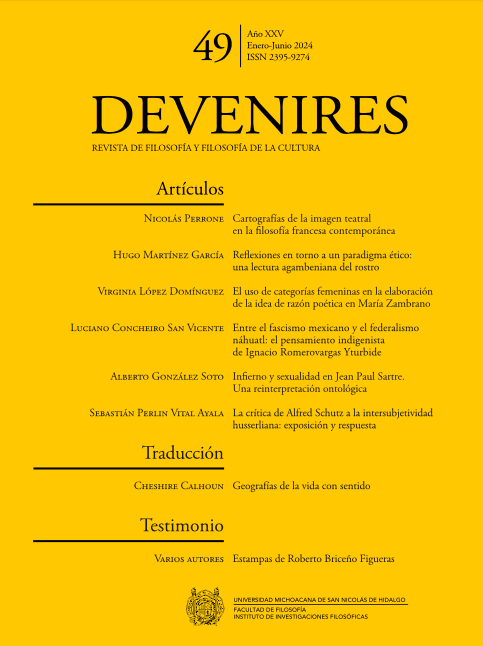Geografías de la vida con sentido
Cheshire Calhoun
DOI:
https://doi.org/10.35830/devenires.v25i49.913Palabras clave:
el sentido de la vida, estándares evaluativos independientes-del-agente, estándares evaluativos dependientes-del-agente, perspectiva normativaResumen
Porque no está nada claro lo que captura o debería capturar ‘con sentido’ cuando se aplica a una vida, cualquier explicación de la vida con sentido será constructiva y no meramente clarificadora. ¿En qué lugar de nuestra geografía conceptual queda mejor ubicado ‘con sentido’? ¿Qué trabajo conceptual queremos que haga el concepto? Las que denomino concepciones del sentido independiente-del-agente e independiente-del-agente-plus, ubican ‘con sentido’ dentro de la geografía conceptual de los estándares evaluativos independientes-del-agente y asignan a ‘con sentido’ el trabajo de elogiar vidas. Argumento que las implicaciones no del todo deseables de estos enfoques más dominantes del sentido, hacen que sea plausible ubicar a ‘con sentido’ en una geografía conceptual diferente —aquella de los agentes como fijadores-de-fines y de las evaluaciones de valor dependiente-del-agente—, a la vez que hacen plausible asignarle al concepto el trabajo de seleccionar vidas cuyos gastos-de-tiempo son inteligibles para el agente. Respondo al desafío al que se enfrenta cualquier concepción subjetivista del sentido, a saber, que es demasiado permisiva.
Citas
Robert Audi, “Intrinsic value and meaningful life”, Philosophical Papers 34 (2005): 331-355.
Tal Brewer, “Savoring time: Desire, pleasure, and wholehearted activity”, Ethical Theory and Moral Practice 6 (2003): 143-160.
Cheshire Calhoun, “Standing for something”, Journal of Philosophy 92 (1995): 235-260.
Steven Darwall, Impartial Reason (Ithaca, NY: Cornell University Press, 1983).
Harry Frankfurt, “On the usefulness of final ends”, Iyyun: The Jerusalem Philosophical Quarterly 41 (1992): 3-19.
Harry Frankfurt, The Reasons of Love (Princeton, N.J.: Princeton University Press, 2004).
Betty Friedan, The Feminine Mystique (Nueva York: Dell, 1964).
Sally Haslanger, “Gender and race: (What) are they? (What) do we want them to be?”, Noûs 34 (2000): 31-55.
Sally Haslanger, “Oppressions: Racial and other”, en Resisting Reality: Social Construction and Social Critique (Nueva York: Oxford University Press, 2012).
Thomas Hurka, “The well-rounded life”, Journal of Philosophy 84 (1987): 727-46.
John Kekes, “The informed will and the meaning of life”, Philosophy and Phenomenological Research 47 (1986): 75-90.
Brian Kolodiejchuk, Mother Teresa, Come Be My Light: The Private Writings of the 'Saint of Calcutta' (Nueva York: Doubleday, 2007).
Alastair MacIntyre, After Virtue: A Study in Moral Theory (Notre Dame, IN: University of Notre Dame Press, 1981).
Thaddeus Metz, “Utilitarianism and the meaning of life", Utilitas 15, 1 (2003): 50-70.
Thaddeus Metz, “The meaningful and the worthwhile: Clarifying the relationships”, Philosophical Forum 43 (2012): 435-448.
Thaddeus Metz, Meaning in Life: An Analytic Study (Nueva York: Oxford University Press, 2013).
David Schmidtz, “The meanings of life”, en Life, Death, and Meaning: Key Philosophical Readings on the Big Questions, ed. por D. Benatar (Lanham, MD: Rowman & Littlefield, 2010).
Valerie Tiberius, "Value commitments and the balanced life", Utilitas 17(1) (2005): 24-45.
Gary Watson, “Free agency”, Journal of Philosophy 72 (1975): 205-20.
Susan Wolf, “Meaning and morality”, Proceedings of the Aristotelian Society, New Series, 97 (1997): 299-315.
Susan Wolf, “Happiness and meaning: Two aspects of the good life”, Social Philosophy and Policy 14 (1997): 207-225.
Susan Wolf, “The true, the good, and the loveable: Frankfurt's avoidance of objectivity”, en Contours of Agency: Essays on Themes from Harry Frankfurt, ed. por Sarah Buss y Lee Overton (Boston, MA: MIT Press, 2002), 227-224.
Susan Wolf, Meaning in Life and Why it Matters (Princeton, N.J.: Princeton University Press, 2010).
Wai-hung Wong, “Meaningfulness and identities”, Ethical Theory and Moral Practice 11 (2008): 123-148.
Descargas
Publicado
Cómo citar
Número
Sección
Licencia
Derechos de autor 2024 UMSNH

Esta obra está bajo una licencia internacional Creative Commons Atribución-NoComercial-SinDerivadas 4.0.




